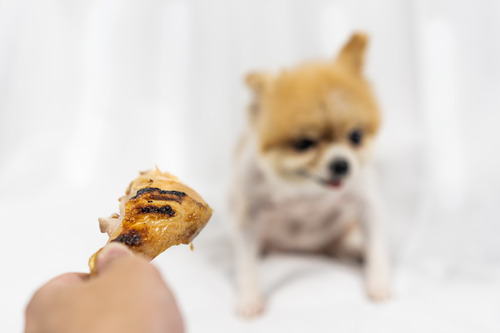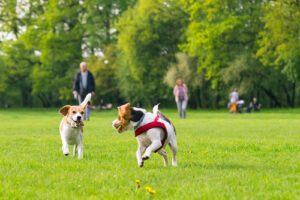Dogs are curious by nature, and sometimes their curiosity leads them straight to food that isn’t safe. One common situation pet owners may face is discovering their dog ate a chicken bone. While it might seem harmless at first glance, chicken bones can cause serious health concerns for dogs. This blog will walk you through why chicken bones are risky, what signs to watch for, when to call your veterinarian, and how to prevent future incidents. If your dog ate a chicken bone in Broomfield, CO, call Broomfield Veterinary Hospital at 303-466-1764 or book an appointment online today. Acting quickly can protect your dog’s health and give you peace of mind.
Why Chicken Bones Are Unsafe for Dogs
When a dog eats a chicken bone, it’s important to recognize the potential dangers. Chicken bones are not the same as the safe, veterinarian-approved chews and treats designed for dogs.
Cooked vs. Raw Chicken Bones
Cooked chicken bones are especially dangerous. The cooking process makes them brittle, which means they are more likely to splinter into sharp fragments. Raw chicken bones may not splinter as easily, but they still carry risks, including choking or blockages.
Risks from Splintered Bones
If your dog ate chicken bone fragments, several issues may arise:
- Mouth and throat injuries: Splinters can cut delicate tissues.
- Choking hazards: A larger piece of bone can block the airway.
- Digestive blockages: Bones can lodge in the stomach or intestines.
- Perforations: Sharp fragments may puncture the digestive tract, leading to internal bleeding or infection.
Even if your dog seems fine after eating a chicken bone, hidden risks may still exist.
Why Dogs Try to Eat Chicken Bones
To understand why this happens, it helps to look at natural canine behavior. Dogs are instinctively drawn to bones, especially ones that smell like meat.
Instincts and Temptations
- Smell of food: Chicken bones carry strong aromas that attract dogs.
- Chewing drive: Dogs love to chew, and bones satisfy that urge.
- Scavenger behavior: Dogs explore the world with their mouths, making food scraps especially tempting.
This natural attraction makes prevention an important part of caring for your pet.
Symptoms to Watch If Your Dog Ate a Chicken Bone
If your dog ate chicken bone pieces, you’ll want to keep a close eye on their behavior. Symptoms don’t always appear right away, but certain signs indicate something could be wrong. These include:
- Coughing, gagging, or choking sounds
- Drooling or pawing at the mouth
- Vomiting or retching
- Loss of appetite
- Bloating or abdominal swelling
- Whining or showing signs of pain when touched
- Lethargy or lack of energy
- Blood in stool or vomit
Subtle Changes That Matter
Sometimes the signs are more subtle. If your dog seems unusually quiet, reluctant to eat, or just “not themselves,” it’s best to call your veterinarian. Small changes can be early indicators of a bigger problem.
Why You Should Call Your Veterinarian Right Away
If your dog ate a chicken bone, contacting your veterinarian is the safest decision. Even if your pet isn’t showing immediate symptoms, an exam can confirm whether medical care is needed.
What Happens During a Veterinary Visit
- Physical exam: Your vet checks for mouth injuries, abdominal pain, and overall health.
- Imaging tests: X-rays or ultrasounds may be used to see if bones are stuck or causing blockages.
- Monitoring plan: Depending on findings, your vet may recommend observation or further treatment.
- Medical intervention: In some cases, endoscopy or surgery may be needed to remove lodged bones.
Broomfield Veterinary Hospital can provide emergency vet care for your companion tailored to their specific needs. Call us at 303-466-1764 for guidance.
Why Home Remedies Are Not a Safe Option
If your dog ate chicken bone fragments, you may feel tempted to try home remedies. However, these approaches can create more harm than good.
Risks of At-Home Approaches
- Inducing vomiting may cause sharp fragments to injure the throat.
- Feeding additional food doesn’t guarantee safe passage of bones.
- Waiting without veterinary input increases the risk of complications.
Only your veterinarian can safely determine the right approach. Avoid home treatments and call your vet instead.
How to Prevent Your Dog from Eating Chicken Bones
Since dogs naturally want to chew and explore food, prevention is the best way to avoid emergencies.
Everyday Prevention Strategies
- Use trash cans with tight-fitting lids.
- Don’t allow family or guests to feed bones to your dog.
- Supervise your dog at family gatherings where chicken is served.
- Pick up dropped food immediately.
Training as a Prevention Tool
Basic training commands like “leave it” or “drop it” can also prevent accidents. Teaching your dog these commands can be a lifesaver when they encounter dangerous items.
Safer Alternatives to Chicken Bones
Since chewing is natural and healthy for dogs, offering safe alternatives helps redirect their chewing instincts.
Veterinarian-Approved Options
- Rubber chew toys: Durable and safe for long-term use.
- Dental chews: Support oral health while satisfying chewing needs.
- Frozen treats: Can soothe and entertain dogs, especially in warm weather.
Choosing the Right Chew for Your Dog
Every dog is different. Age, size, and chewing style all matter when selecting chew options. Ask your veterinarian which alternatives are best for your pet.
What to Expect If Treatment Is Needed
If your dog ate chicken bone fragments and needs veterinary care, understanding what may happen next can reduce your stress.
Possible Veterinary Interventions
- Endoscopy: A minimally invasive tool to retrieve bones from the stomach or esophagus.
- Surgery: Reserved for severe blockages or perforations.
- Supportive care: Includes fluids, pain relief, and monitoring.
Recovery After Treatment
Most dogs recover well with prompt care. Your veterinarian will guide you through aftercare, including diet recommendations and follow-up visits.
Acting Quickly Protects Your Dog
If your dog ate a chicken bone, fast action is the key to preventing complications. Even if your dog appears fine, internal injuries or blockages can develop later. If you live in Broomfield, CO, contact Broomfield Veterinary Hospital at 303-466-1764 or book an appointment online today. Your quick response ensures your dog receives the care they need.





